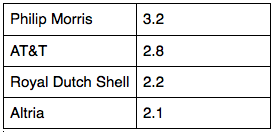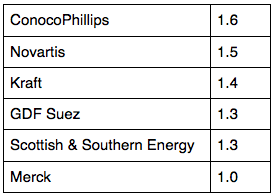Time for a new feature on Control Your Cash, where we’ve taking to scouring the internets to find personal finance bloggers we can hold up as examples of what not to do with your money. We’re thinking of doing this weekly, although we could probably feature a different retard every hour.
Today’s honoree is Sallie’s Niece, who lives in New York state and is busy creating an anti-nest egg. (NOTE: We’re not providing links. She doesn’t need the traffic from a popular blog like ours. But you really should witness this foolishness firsthand.)
Her disclaimer (everyone has a disclaimer, except us) starts off with the funny:
I am in NO way qualified to answer any financial questions
You’ll find out why shortly. The “Sallie” in question is Sallie Mae, the money-losing boondoggle that enables people ostensibly on the cusp of adulthood to defer productivity for years if not decades. To hear the niece in question describe it,
I’m a 30 (gasp!) year old professional woman struggling to pay off my student loans, live on a budget, and plan for the future.
Here at Control Your Cash, we’re old enough to remember when “professional” meant something. It meant that you were a doctor or an engineer, not that you simply had a job.
Guess how many student loans this financial drain took out? Remember, she’s an individual, not sextuplets.
SIX. Six freaking student loans. Including a law school loan that she managed to pay off. We’ll let you know the parade route once it’s scheduled. Rounded to the nearest thousand, her remaining loans total $40,000, $33,000, $21,000, $19,000 and $6,000. For a total of $118,000, a debt which no 30 (gasp!) year-old should incur unless she’s buying a house.
Still got some food remaining in your gullet? Here’s an emetic we can all enjoy. This woman works in some level of government and is, well, we’ll quote the original source:
Assuming I make the same salary for the next 6 years I will have contributed about $14,000 to my pension. Then I stop contributing but keep working for at least 10 more years. How much do I get?
Using a final average salary of $49,312, when I am 57 years old I will have 30 years of service credit. I will thus be eligible for a Single Life Allowance of $29,587 a year. That’s 60% of my final average salary. All for contributing just $14,000! This is totally morbid but even if I only collect for one year I am getting 2x my money back!
Why are state and municipal governments (to say nothing of the big one in Washington) drowning in debt? No idea whatsoever. Can’t quite place our finger on it.
Where would your priorities be if you were carrying $118,000 in student loans, while financing a laptop; carrying a credit card (you’re not going to believe this, but there’s credit card debt, too); borrowing money from a friend, a fiance-cum-husband and your mom; and aren’t even organized enough to pay your water bill on time? Don’t know about you, but we’d spend $7000 on a wedding!
You know, that change in your legal status that any justice of the peace can handle if you spend $40 on a license. But what’s the fun in that, when you can spend $6,960 more? You’d have to be crazy to apply that money to your student loan balances instead.
It’s the brazenness that gets us more than anything else. One of this woman’s stated goals is to increase her net worth to -$100,000 this year. She hopes to one day achieve the rarefied financial air of her husband (she calls him “DH”, for “dear husband”, and isn’t that precious?), who last clocked in at a robust -$15,000.
She uses terminology such as “fun money”, which we can only assume goes for pedicures and other non-assets. Listen: if you’re $100,000 in the hole, you don’t get “fun money”. You get debt reduction money, and maybe a buck or two to feed and clothe yourself with.
People often ask the CYC principals how we’ve managed to lead lives of relative affluence. Two answers. One, read the book. Two, by not doing the same idiotic, self-destructive crap that other people do. This doesn’t require anything beyond a 1st-grade comprehension of math. At its absolute most basic, income > expenses. Replace the > with a = or a <, and you can’t build wealth. Even if you’re sucking at the public teat like our friend Sallie’s Niece.
Here’s our favorite line from her archives, from April:
(The husband and I) recently combined finances.
Oh, this is going to end spectacularly. If you’ve never heard Mark Steyn’s line about dog feces and ice cream (or in this case, dog feces and slightly less pungent dog feces), Google it.
It gets even better. She donates to the Corporation for Public Broadcasting, completely unaware that she’s the charity case. What’s the best way to help poor people? Not adding to their ranks. This isn’t a case of there always being someone less fortunate than you. This is a case of needing to get your own house in order before vacuuming the neighbors’ carpets.
(NOTE: We’d originally used American Cancer Society as our example in the preceding paragraph, but a couple of clicks later we found she’s also donating to the starving unfortunates who run taxpayer-sponsored television that nobody watches. In her words, “I can’t imagine a world without PBS.”)
$200 concert tickets. Trips to Mexico. A “fabulously unfrugal (sic) Hawaiian honeymoon.” She used boldface 24-point type with exclamation points to announce when her consumer debt got down to $122,000. And there’s also:
The base price of my (wedding) dress is $1100, plus planned alterations of $150 and taxes of $104, the total comes out to be $1354.
It never stops. You know what? Forget about the two-pronged advice we just gave about how to build wealth. Instead, simply do the exact opposite of everything Sallie’s Niece does and you’ll be swimming in it.
Make sure you read the congratulatory comments, too. If there’s one thing we Americans do better than anyone else, it’s celebrate non-achievement. Like the morbidly obese woman who shrinks from 800 pounds down to 780, and whose case worker commemorates the meaninglessness by passing out hugs and Pixy Stix. Instead of celebrating the woman who’s always weighed 120 pounds and who goes to the gym every day and eats healthily to maintain that weight.
Oh, and sure enough, Sallie’s Niece is fat. It stands to reason: if you’re grossly undisciplined in one aspect of your life, you’ll be grossly undisciplined in most of them. We couldn’t locate any pictures of her, but people who aren’t fat don’t join Weight Watchers. (Nor do they join a gym as a New Year’s resolution, the surest sign that those pounds are not only staying on but inviting some friends to join them.)
Also, it’s a cleft palate, not a “cleft palette”. (Worst art supply ever.) Look, it’s one thing to make worse financial decisions than a Holstein cow would make. What we don’t understand is why she considers her stunning lack of acumen to be something worth sharing with the world.
And she smokes. Of course. And she “could use a Halloween costume.” (Again, 30 [gasp!] years old.)
Damn. The Chinese can’t invade our shores us fast enough.
**This article is featured in the Carnival of Personal Finance #324: The Universe Edition**







